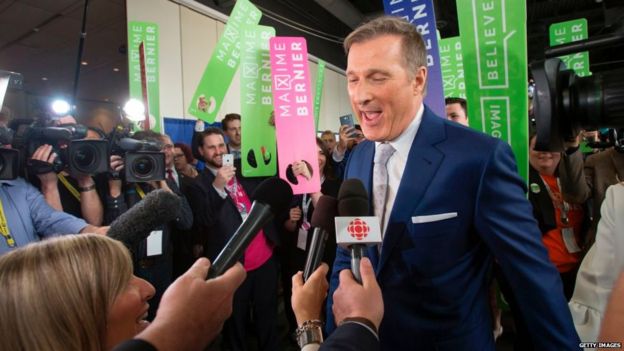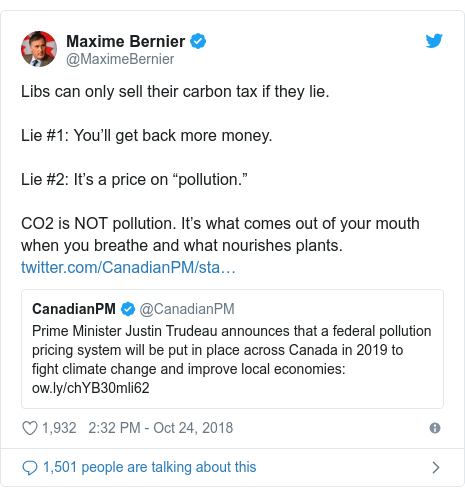88m3
Fast Money & Foreign Objects
Canada election: Charitie confused against climate change ads
 Image copyrightUIG VIA GETTY IMAGES
Image copyrightUIG VIA GETTY IMAGES
Image captionCanada's Arctic is warming faster than southern Canada
Canada's election watchdog has warned environmentalists that saying climate change is real could break the law.
The issue arose because one party running in October's election denies climate change is a threat.
That has led Elections Canada to warn groups that if they run paid advertisements about climate change they must register with the government.
Advocates called the guidance "ludicrous" and say it will dampen urgent climate discussions.
The UN has called for decisive political action by 2020 to put an end to climate change.
"The guidance is extremely troubling," Stephen Cornish, the CEO of the David Suzuki Foundation, an environmental charity, told the BBC.
"We would have to bury the scientific consensus around climate change when we should be ramping up our activities."
What are the rules?
Canada has strict regulations on partisan advertising during the election period, whether they be from candidates, parties or third-party organisations.
Individuals or organisations that take out "issue" advertisements that cost C$500 ($375, £309) or more during the election period have to register with Elections Canada as a third party.
"Issue" advertisements are paid media campaigns that take positions on issues related to parties' platforms but do not explicitly address a particular candidate or party.
The election period will begin when the writ is dropped sometime in September, before Canadians head to the polls on 21 October.
Why is climate change an issue?
Elections Canada told environmental groups that because one candidate does not believe in a climate change emergency, any ad urging action on climate change could be considered "issue advertising" during the election period.
Maxime Bernier, the leader of the People's Party of Canada, has said numerous times that he does not believe climate change is a crisis.
"There is no climate change urgency in this country," Mr Bernier said in June.
 Image copyrightGETTY IMAGES
Image copyrightGETTY IMAGES
Image captionMaxime Bernier has quit the Conservative Party of Canada, months after losing its leadership race, where he is pictured here
Mr Bernier split from the Conservative Party of Canada last year to create the People's Party.
The party's platform states that "it is an undisputed fact that the world's climate has always changed and will continue to change".
 Image Copyright @MaximeBernier@MAXIMEBERNIER
Image Copyright @MaximeBernier@MAXIMEBERNIER
Report
What do environmental groups say?
Mr Cornish says it is "absolutely ludicrous" that charities are barred from advocacy work on climate change during the election just because one of the party's platforms denies it is an issue.
"We're talking here about someone's opinion overruling scientific consensus around the need to adapt to climate change," he said.
A spokesperson for Elections Canada told the BBC there is no way of knowing if climate change will be an issue until the election officially begins, but that the law does not care whether the position taken by a candidate is correct or not.
"The validity of the position does not matter," explained Elections Canada spokesperson Natasha Gauthier.
Keith Brooks, programme director for advocacy group Environmental Defence, says he and other groups were told by Elections Canada that ads urging action on climate change would be considered partisan.
This was concerning because as a charity, Environmental Defence is not allowed to engage in partisan activity, and could lose its tax-exempt status.
But after media reported on Elections Canada's guidance, Canada's chief electoral officer clarified the authority's position. Issue advertisements are not considered partisan, so long as they do not name a party or candidate directly.
They are considered election ads, and the groups that pay for them must still register with the government.
This is still a no-go for Mr Brooks.
The registration process is onerous and would end up costing the organisation more money.
"The clarification is helpful," he said. "But we would still like to be able to talk about climate change as an established scientific fact without having to register."
Why Canadians won't see ads about climate change
awful country
- 6 hours ago

Image captionCanada's Arctic is warming faster than southern Canada
Canada's election watchdog has warned environmentalists that saying climate change is real could break the law.
The issue arose because one party running in October's election denies climate change is a threat.
That has led Elections Canada to warn groups that if they run paid advertisements about climate change they must register with the government.
Advocates called the guidance "ludicrous" and say it will dampen urgent climate discussions.
The UN has called for decisive political action by 2020 to put an end to climate change.
"The guidance is extremely troubling," Stephen Cornish, the CEO of the David Suzuki Foundation, an environmental charity, told the BBC.
"We would have to bury the scientific consensus around climate change when we should be ramping up our activities."
What are the rules?
Canada has strict regulations on partisan advertising during the election period, whether they be from candidates, parties or third-party organisations.
Individuals or organisations that take out "issue" advertisements that cost C$500 ($375, £309) or more during the election period have to register with Elections Canada as a third party.
"Issue" advertisements are paid media campaigns that take positions on issues related to parties' platforms but do not explicitly address a particular candidate or party.
The election period will begin when the writ is dropped sometime in September, before Canadians head to the polls on 21 October.
Why is climate change an issue?
Elections Canada told environmental groups that because one candidate does not believe in a climate change emergency, any ad urging action on climate change could be considered "issue advertising" during the election period.
Maxime Bernier, the leader of the People's Party of Canada, has said numerous times that he does not believe climate change is a crisis.
"There is no climate change urgency in this country," Mr Bernier said in June.

Image captionMaxime Bernier has quit the Conservative Party of Canada, months after losing its leadership race, where he is pictured here
Mr Bernier split from the Conservative Party of Canada last year to create the People's Party.
The party's platform states that "it is an undisputed fact that the world's climate has always changed and will continue to change".
Report
What do environmental groups say?
Mr Cornish says it is "absolutely ludicrous" that charities are barred from advocacy work on climate change during the election just because one of the party's platforms denies it is an issue.
"We're talking here about someone's opinion overruling scientific consensus around the need to adapt to climate change," he said.
A spokesperson for Elections Canada told the BBC there is no way of knowing if climate change will be an issue until the election officially begins, but that the law does not care whether the position taken by a candidate is correct or not.
"The validity of the position does not matter," explained Elections Canada spokesperson Natasha Gauthier.
- Canada warming twice as fast as the rest of the world
- 12 years to save the planet? Make that 18 months
Keith Brooks, programme director for advocacy group Environmental Defence, says he and other groups were told by Elections Canada that ads urging action on climate change would be considered partisan.
This was concerning because as a charity, Environmental Defence is not allowed to engage in partisan activity, and could lose its tax-exempt status.
But after media reported on Elections Canada's guidance, Canada's chief electoral officer clarified the authority's position. Issue advertisements are not considered partisan, so long as they do not name a party or candidate directly.
They are considered election ads, and the groups that pay for them must still register with the government.
This is still a no-go for Mr Brooks.
The registration process is onerous and would end up costing the organisation more money.
"The clarification is helpful," he said. "But we would still like to be able to talk about climate change as an established scientific fact without having to register."
Why Canadians won't see ads about climate change
awful country